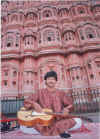| the-south-asian.com AUGUST 2001 | ||
| about us contact us data bank past issues the craft shop the print gallery | ||
|
SOCIETY & CULTURE Traditional
societies - Wisdom and Challenges SOUTH ASIAN FEATURE Hands
Across Borders INTERVIEW
Shantiniketan
and origin of Modern Art
Reinventing
India
Royal
Bengal's last roar?
|
Page 2 of 3 Generation 2000 of Music Gharanas
by Mukesh Khosla
Salil Mohan Bhatt, son of Pandit Vishwa Mohan
Bhatt, plays the Mohan
Veena and released his debut album, Raga Puriya Kalyan in January
1998. Pandit Vishwa Mohan Bhatt, the legendary musician and Grammy award
winner of the 1993 album A Meeting by the River, represents the tenth
generation of the Bhatt lineage. Salil feels, being the son of a famous
father may have its disadvantages but it sure gives a head start. "
I've gone through it. Initially people judge your performances on the basis
of the high standards set up by the father. They don't understand the son is
just starting off whereas the father has been around for years," says
Salil, who has trained on the Mohan Veena for 12 years under the tutelage of
his father. The Mohan Veena is a creation of his father - a combination of
the Hawaiian guitar and the Vichitra Veena - that catapulted Vishwa Mohan
Bhatt from Rajasthan to world fame and fortune. However, 27 year old Salil, who gave his first solo performance at a youth music festival at
Mangalore, is a trifle disappointed. " Though people have been praising
my efforts they have already started comparing me with my father. They come
up to me and say, 'You are good but you are still far behind Panditji.
You'll have to work very hard to attain his eminence.' I think that's being
very unfair. I may not be as great as my father but then, I am ready to team
up with him." Salil was selected for the Indian Military Academy
in 1991 but the pull of the 500 years
old music tradition in the Bhatt household was stronger. Salil considers his
father his greatest inspiration and ultimate guru. 25 year old Rahul, too, is ready to compete with his father, santoor
maestro Pandit Shiv Kumar Sharma. Earlier Rahul was just one of the many
musicians who accompanied his father in background scores. He gave a stirring jugalbandi performance with his father in
Mumbai last December. "I want to popularise the santoor with my
generation. I am now starting solo," says the young master. Wasifuddin Dagar's emergence as the 20th generation Dhrupad singer of his
family was heralded by rather tragic circumstances. Although he had been
giving solo performances, it was his father, Faizuddin Dagar's death that
came as the turning point. Just a few days after his father’s passing away
Wasif was asked to accompany his paternal uncle on stage. "Just one day
before the due date I came to know I was going on stage. I was not at
all prepared. I expressed my apprehensions, whether I should accompany my
uncle or not. But he was very encouraging. He made me believe I could
captivate the listeners." And captivate he did. Wasifuddin now recalls
fondly, " that was the most sentimental moment of my life. It was all
due to my father's training, and because I was born in a family of great
musicians." Many people might not take easily to a singer's son
becoming a singer himself. `Undue advantage of father's position' is the
thought that comes immediately to mind. But Dagar says this happens in every
profession. " …in performing arts, it is all too visible. A
photographer's work is confined to a dark room. And a writer writes in
seclusion. Only the sound of music permeates in every corner of the
house." Legacy indeed makes a big difference, especially in performing arts.
Psychologists say it is the environment more than the heredity that
inculcates the urge for music in a young child. Thus, Amaan says his
training started at the age of four. ".. When you are born into a
musical family, the actual initiation starts from childhood. Even when I was
a baby, my parents used to sing to me." Dhrupad singer Wasifuddin Dagar
concurs with him, saying, "In the initial years I was not given
training but what I had was the essential atmosphere. The value of the
musical tradition was inculcated in me. The rest I began to comprehend
subconsciously. It became a way of life for me". Dagar admits that as a
child there were times when he would be distracted by other things. "
Many a times I wanted to go out and play but I was made to sit for music
lessons. But it never took more than five minutes for my attention to divert
from the playground to music." As a student Dagar was equally tunnel
visioned. " While most of the
students of my age were pondering what career to pursue, I had my
future cut out in front of me. I wanted to be a musician and I never thought
of doing anything else."
Copyright © 2000 - 2001 [the-south-asian.com]. Intellectual Property. All rights reserved. |
|
